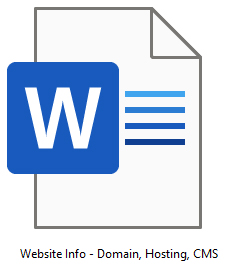Have the foresight to ensure business operations don’t grind to a halt all because of missing or lost website usernames and passwords.
Video Transcript
Hello, it's Darren from Ilkeston Web Design. Now this is an important video and I really want you to pay attention to this because this might not have happened to you but we want to avoid this ever happening.
This is about how forgotten passwords kill businesses.
Building a website is complex. It relies on multiple third-party tools and services, the most obvious of which is web hosting, domain, email, but there will be other services as well depending on what kind of website is being built. The question is who is: keeping track of all of this information, all these emails, usernames, passwords... where is that kept?
So, here's a typical story...
Somebody approaches a web design company, agency, freelance – whatever – and says, "We've got a website, we need to rebuild it, we need to relaunch it. How do we do that?" And first question is, "Well, do you have access to your domain registrar account or your web hosting account? Do you have access to the WordPress dashboard?"
And then the business owner sort of goes, "Mmm, I don't know any of that. I can't remember the passwords. I've got no idea."
What's happening is: the website is running, it's online, but nobody knows who's hosting it, who's got the passwords, how much they're paying, how to access any of this stuff... and it's a bottleneck and a headache.
Really what it is, is – and this isn't always the business owner's fault, but the business owner is responsible so they need to choose more carefully when they engage the services of a web designer – it's an example of bad communication and ultimately it's a failure to plan ahead.
Really you want passwords all on one page that can all live in a central location.
Now a digital Word document is best because then you can print it out and you can keep these passwords in a safe. Obviously, if any of the passwords change, they need to be updated.
But I personally would recommend that you keep all this stuff in a Word document because some of these passwords can be long and difficult to remember. You're not supposed to be using easy to-guess-passwords, so you want to put all this stuff inside a Word document and then you can password protect the Word document with one password. So it's one password to open a document in order to see all of the passwords, because, let me tell you, if someone else is holding on to all this stuff and you don't have a goddamn clue, that's a bad strategy.
Well, let's imagine that the person who is responsible for holding on to all these passwords dies. What then?
Does all that knowledge die with that person? So at the very least, you as a business owner, you need to have access to this stuff because you might need to engage the services of a web designer and you're going to need to give them a document with all the passwords so that they can get on with their job.
The question is: can you gain access to your own web hosting account, just as a thought experiment? I'm not saying you need to go and do that right away, but if you had to, could you do it?
Here's a scenario: imagine your debit card is lost or stolen.
After your bank issues you with a new card, you're going to have to go through the process of updating your payment details everywhere for your web hosting, your domain email, and any plugins or extensions that you've paid for as part of your website.
Here's a story, and I hate this story, I'm going to tell it anyway, and it's not quite what we're talking about, but it illustrates the point. Gabriel Arbed, 34, an entrepreneur from Barbados, lost around 800 bitcoin, now worth around $25 million when a colleague reformatted a laptop that contained the private passwords to his bitcoin wallet in 2011.
And that's from an article on the New York Times called, "Lost Passwords Lock Millionaires Out of Their Bitcoin Fortune". How much time and money do you think that person spent trying to regain access to their bitcoin wallet?
Not quite the same thing, but there's money at stake here, and it doesn't matter how much money you're making in your business, I mean, you can't afford for these little mistakes to be allowed to happen. There's enough to think about without being derailed by something as obvious as a goddamn forgotten password. It's a bit like locking yourself out of your own house.
The good news is, if you've done all this, and you've put all this in place, if your trusted web designer, web developer, whoever it happens to be, if they get crushed by a falling piano or trampled to death by angry cattle, they're replaceable.
There's not as much to worry about, because with this password document at your disposal, the wheels of your business keep turning, you save time, you save money, you avoid potential headaches and stress.
So my recommendation is hire someone who actually thinks about these things, somebody who thinks ahead on your behalf and helps prevent small issues turning into disasters.
If you have a business problem that involves your website, visit IlkestonWebDesign.com and we'll see if I can help you.
As the Roman emperor Marcus Aurelius lay on his death bed, the last words he breathed to his trusted bodyguard before kicking the bucket and being remembered for his Stoic philosophy was: “Who has all the passwords?”
Well, if he’d been alive in the 21st Century he probably would have said that.
All I’m saying is, our fragile present day digital empires rise and fall depending on who has the correct login access for this, that and the other, yet so many of us tie ourselves up in knots by creating unnecessary panic, stress and stalled business operations because nobody knows what email/username/password was used to register the domain, hosting and God knows what else.
Enough!
Thankfully, a little foresight (and this includes basic project management) can save hours, days, weeks – perhaps even months – of faffing about. 🛡️
Let Me Help You Get Your Shit Together 📋
Looking for bits of paper, post-it notes or emails supposedly containing important details is… exhausting. 😩
You can almost imagine the hapless business owner reduced to a blubbering child-like buffoon, similar to Michael Crawford as Frank Spencer in Some Mothers Do ‘Ave ‘Em.

“I can’t remember where I put it, Betty!”
Anyway, keeping track of important details is essential. It really is. And it need not be complicated. Want some more Roman philosophy to bring it all into focus? Okay!
“Train hard, fight easy”. 💪
A simple word document with all details clearly entered will solve the problem. Bang the document on a USB stick, and keep that safe. Guard it with your life. 🫡
Alternatively, put the document on a shared Google Drive folder and grant access to certain people.
You and your inner circle can quickly copy/paste those important details whenever someone needs to log in to something.
Create the Conditions for Smooth Operations ⚙️
Ever lost your bank card? Ever had the hassle of not only getting a new card issued but having to log in to all your online accounts that rely on direct debit in order to update everything?
Pain in the arse, obviously and the stress is compounded when it’s hard to remedy the situation quickly.
Here’s a sample list of what can/does go wrong:
- 🤦 The website going offline because the hosting company couldn’t take payment
- 🤦 The domain expiring because it wasn’t set to auto renew
- 🤦 An outdated WordPress plugin causing something on the website to stop functioning
- 🤦 And more problems…
So, if your business leans heavily on your website being operational, losing or forgetting important login details is unacceptable. Gotta nip small issues in the bud before they become a real pain.
As an aside: if you buy a Yell website you’ll never have any access to anything because the website won’t be owned by you.
Summary: Don’t Get Locked Out
Alright, here’s a somewhat related, tragic story to illustrate…
A bloke from Barbados locked himself out of his crypto wallet. Gabriel Arbed, aged 34, owns 800 bitcoin that became worth £25m when the value soared. 📊
He couldn’t access the crypto tokens in the wallet and exchange them for cold hard spendable cash all because he couldn’t get in to the sodding thing. 🔒
This would-be-but-not-quite crypto millionaire story is not the same as lost/forgotten passwords for domain, hosting, email and all the other third party services, but you get the point.
Some level of administrative predictability is preferable to the annoying, hellish hassle of trying to track down people who built your website years ago, but perhaps moved to another country or just can’t be reached.
Click below if you want a well-planned MS Word doc for usernames, email addresses, passwords, etc.

